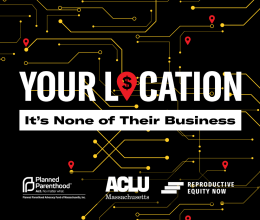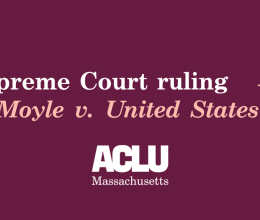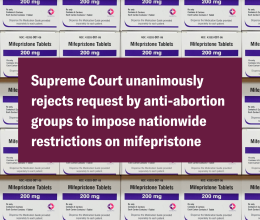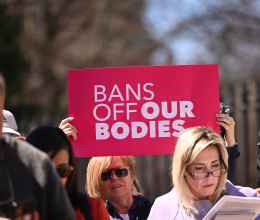
46 years after Roe v. Wade, the future of reproductive freedom is still undecided.
Blog by Carol Rose, executive director of the ACLU of Massachusetts
Today, we reflect on 46 years of legal abortion in the United States thanks to the historic Supreme Court decision, Roe v. Wade. The freedom to define our own path—including whether or not to carry a pregnancy—is a basic right and part of what it means to live a safe and healthy life.
But, on its 46th anniversary, Roe v. Wade is in danger like never before. Across the country, anti-abortion politicians have quietly passed laws that push abortion care out of reach. Some states are trying to ban abortion outright. The White House is hell-bent on interfering with personal health care choices. The Trump administration’s next attorney general has long been a critic of abortion rights, and the elevation of Brett Kavanagh to the Supreme Court puts Roe in grave danger.
As the right to abortion is attacked across the country, Massachusetts has an opportunity to be bold.
Last legislative session, we celebrated many victories that safeguard the right to make the most fundamental decisions about our bodies, our families, and our lives, no matter what happens federally. The ACLU of Massachusetts fought for—and won—a trifecta of victories improving access to essential reproductive health care for all: When the Trump administration announced its executive order to block birth control access, we pushed Massachusetts leaders to quickly pass the ACCESS Act to protect and expand contraceptive access for people throughout the Commonwealth. But we recognize that a right to health care on paper—without a guarantee of confidentiality—may not mean a lot to a young person on their parents’ heath plan. So, we changed the law to protect patient privacy and turn the promise of health access into a reality. And later, when President Trump promised to appoint Supreme Court justices who would overturn Roe v. Wade, we urged Beacon Hill to swiftly repeal an archaic, unconstitutional abortion ban still moldering on the books in Massachusetts—and they did.
Now, we’re building on that momentum and advocating for new, affirmative abortion access protections. The ROE Act would remove every barrier to care and reform our state’s abortion laws to ensure that anyone, regardless of age, income, insurance or legal status, can access safe, legal abortion. If passed, the ROE Act would make Massachusetts the leader in reproductive freedom, and a national model of removing barriers to abortion.
Since it was decided in 1973, Roe v. Wade has ensured that generations of people have had access to abortion—but there’s more work to do. Whatever happens nationally, the ACLU will be there—fighting back in court, advocating for the ROE Act and other state policies that protect and expand abortion care, and organizing on the ground to build a future of freedom where the legal right to abortion guaranteed by Roe v. Wade is unfettered.
Related content


Reproductive advocacy groups applaud House effort to protect...
July 9, 2024
ACLU of Massachusetts statement on Supreme Court decision in...
June 27, 2024
ACLU of Massachusetts statement on Supreme Court decision in...
June 13, 2024
ACLU of Massachusetts comment on Supreme Court arguments in...
March 26, 2024
Cellphone location data used to target abortion misinformation to...
February 13, 2024
ACLU comment on Supreme Court decision in medication abortion case
December 13, 2023
Advocates, experts call on lawmakers to ban sale of cellphone...
June 26, 2023